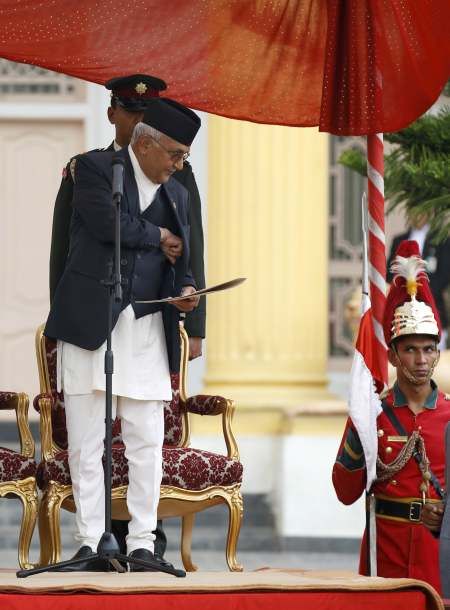 | « Back to article | Print this article |
 Veteran Communist leader K P Sharma Oli was on Monday sworn in as Nepal's 38th prime minister, a day after he was elected in Parliament with support from smaller parties, even as the country is grappling with political unrest over the new Constitution.
Veteran Communist leader K P Sharma Oli was on Monday sworn in as Nepal's 38th prime minister, a day after he was elected in Parliament with support from smaller parties, even as the country is grappling with political unrest over the new Constitution.
Oli, 63, was administered the oath of office and secrecy by President Ram Baran Yadav at his official residence in Khatmandu.
Prime Minister Oli also has formed a small cabinet incorporating two deputy prime ministers and five ministers as he chaired his first cabinet meeting.
Bijay Kumar Gachhadar and Kamal Thapa were sworn in as deputy prime ministers. The two are said to have been rewarded for their support to Oli in Parliament.
Gachhadar, the president of Madhesi Peoples Rights Forum Democratic, a key Madhesi party, has been allocated with the portfolio of Physical Planning and Transport while Thapa, president of Rastriya Prajatantra Party-Nepal received the portfolio of foreign affairs.
The five other ministers included in Oli's cabinet are Agni Kharel, Satya Narayan Mandal, Som Pandey, Haribol Gajurel and Ram Kumar Subba.
Oli, who will now have to deal with challenges like protests and blockade of a key border trade point with India over the country's new Constitution, was elected as Nepal's new prime minister after comfortably defeating former premier and Nepali Congress chief Sushil Koirala.
In voting held in Parliament on Saturday, Communist Party of Nepal - Unified Marxist Leninist chairman Oli garnered 338 votes, 39 more than the 299 that he needed to be elected as prime minister while Koirala could secure only 249 votes. A total of 587 members cast their votes. Lawmakers were not allowed to stay neutral during the voting.
While Oli was backed by UCPN-Maoist, Rastriya Prajatantra Party-Nepal, Madhesi Janaadhikar Forum-Democratic and some fringe parties; four Madhes parties in the United Democratic Madhesi Front had supported NC leader Koirala who himself became prime minister with the support from CPN-UML in 2014.
Oli served as the deputy prime minister and minister for foreign affairs in the Girija Prasad Koirala-led interim government formed immediately after the 2006 People's Movement. He takes over as prime minister at a crucial time as Nepal has been wracked by violent political protests by Madhesi people protesting against the new Constitution. He faces the daunting task of unifying the quake-hit country that has been rocked by deadly protests.
The country has also been locked in a diplomatic standoff with India over the supply of essential goods, including petroleum products, which has been hit due to blockade of border trade points with India following the violence.
The agitating Madhesi Front claims that the Constitution does not guarantee enough rights and representation to the Madhesi and Tharu communities residing in southern Nepal.
Madhesis are Indian-origin inhabitants of the Terai region bordering India who are also opposed to splitting Nepal into seven provinces.
Nepal is reeling under severe scarcity of essential goods as agitating Madhes-based parties have blocked all entry points to press for their demands.
Image: Nepal's newly elected Prime Minister Khadga Prashad Sharma Oli searches for a pen to sign documents after administrating the oath of office at the presidential building Shital Niwas in Kathmandu, Nepal. Photograph: Navesh Chitrakar/Reuters